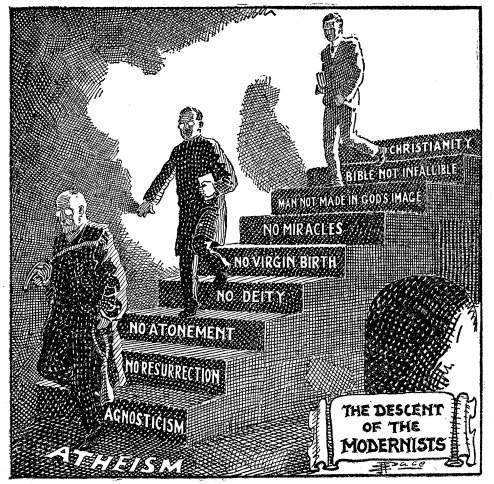The word “Fundamentalism” might make you think of people with unwavering beliefs who refuse to consider alternative views. You could be thinking of people committed to a political ideology on the far left or far right, or maybe a form of religious fundamentalism.
The word is often used interchangeably with “Extremism”, which may make you think of suicide bombers, hate crimes against gays, sexual discrimination against women—anyone who use a “Holy Scripture” to justify violence. Yet you might be interested that its origins were much more specific.
Origins
The term “Fundamentalism” was originally coined in 1920 in reference to a Protestant Christian movement that spread from the United States via a short book entitled The Fundamentals: A testimony to the truth (financed by two Christian laymen to be distributed to ministers and missionaries around the world in 1909).
This series acted as a ‘new statement of the fundamentals of Christianity’ which condemned ‘Darwinism, Higher Criticism, liberal theology, modern philosophy, socialism, materialism, atheism, spiritualism, Romanism, Mormonism, and Christian Science;’ and affirmed ‘the virgin birth, atoning death, bodily resurrection, miracles, and a second coming of Christ, together with Scriptural inerrancy.’[1]
This movement spurred the “Fundamentalist–Modernist Controversy”, as Modernism was imagined to be a descent from Christianity to Atheism:

Why does it continue?
In The Battle for God, Karen Armstrong examines fundamentalism in Christian, Islam and Judaic religions, describing a perceived ‘terror of extinction’, a fear that secularists are trying to wipe them out.
Feeling as though their identity is under attack, fundamentalists have undertaken a campaign to ‘re-sacralize’ society, a cause that has become ‘aggressive and distorted’, initiating a ‘dialectical relationship with an aggressive secularism which showed scant respect for religion and its adherents’. This has essentially trapped secularists and fundamentalists in the ‘escalating spiral of hostility and recrimination’ that is visible today.[2]
Alternatives to Atheism and Fundamentalist Religion
It can often seem like one has a choice to believe in a literal interpretation of a Bible – be it the creation myths or the miracles of Jesus’ life, death, resurrection and ascension, or to live in a Godless world. Yet religion and theology is not so black and white. Good and Evil are ideals that are interpreted by different cultures to be discerned in different ways.
Many fundamentalists are not aware that their unchanging truth is in fact a new interpretation of a truth shaped by theological debates and politics over the last two millennia. Most are unaware that their interpretation of the Bible has been distorted by the modern paradigm from which they see it.
Fundamentalists do not realise that by adopting a simplistic literal interpretation, without regard for Jewish midrashim and the role of mythos, prevents an understanding of the “more-than-literal” meaning that embedded in the Bible.
There are many ways that people understand God without believing “He” [sic] is a supernatural God that is separate from the world. Many such understandings fall into the theological category of “Panentheism” (click to learn more about this natural philosophical theology).
Modern fundamentalism
Now the word fundamentalism, rightly or wrongly, is used in a much broader sense. It is easy to observe fundamentalist approaches not only within Christianity, but also within Islam, Judaism, Hinduism, Buddhism and some say even Atheism.
Whether it is called fundamentalism, or something else, it seems that any ideology – political, religious or other – that holds a one-dimensional perspective as absolute, with a refusal to see that an idea or issue looks different from different standpoints, is dangerous.
Does that makes me a fundamentalistic multi-dimensionalist?
References:
[1] Stuart Piggin, Evangelical Christianity in Australia (Melbourne: Oxford University Press
Australia 1996)., pp. 79-80.
[2] Karen Armstrong, The Battle for God: Fundamentalism in Judaism, Christianity and Islam
(London: HarperCollins, 2000)., pp. 370-371.
Picture:
“The Descent of the Modernists”, by E. J. Pace, first appearing in his book Christian Cartoons, published in 1922.
Source=*File:Descent_of_the_Modernists,_E._J._Pace,_Christian_Cartoons,_1922.jpg Date=2011-07-17 04:3
No Comments Yet